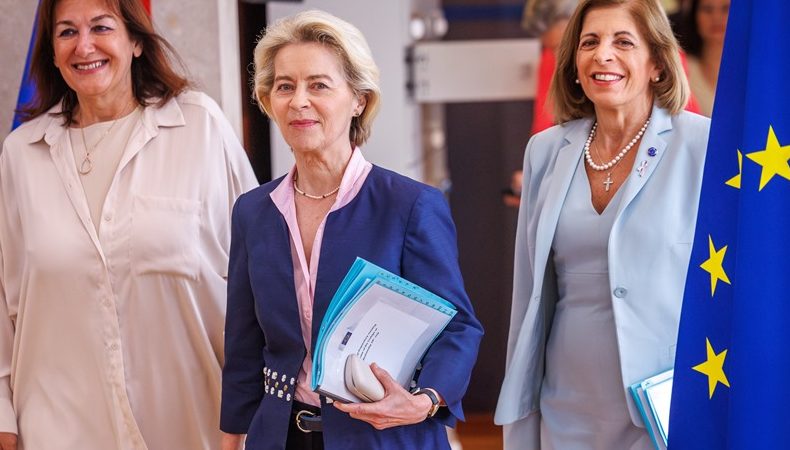Brussels – The European Commission on Wednesday celebrated the “great progress” made in Spain for the renewal and subsequent reform of the General Council of the Judiciary (CGPJ), achieved after the agreement between the PSOE and the PP facilitated by Brussels, and indicated, on the other hand, that it is still analyzing the amnesty law.
The European Executive published its annual report on the Rule of Law, which reviews the efforts of member countries to comply with Brussels’ recommendations in areas such as judicial reform, rules to combat corruption, or freedom and pluralism in the media.
Community Vice-President Vera Jourová recalled at a press conference that this annual report is a “preventive” instrument that helps dialogue with Member States to identify “potential problems” with the rule of law at an early stage and not have to resort to infringement procedures or other mechanisms and assessed the progress in different countries, including Spain.
Judicial Reform
The rule of law reports that the European Commission had published since 2020 had emphasized, in the case of Spain, the need to proceed with the renewal of the members of the CGPJ and, immediately after, reform the appointment of its judges.
The 2024 report considers that “significant progress has been made with respect to the recommendation made in previous years” following the agreement to renew the Council of the Judiciary “and immediately after the renewal, to launch a process with a view to adapting the system of appointment of its judge-members”.
European Justice Commissioner Didier Reynders said on Tuesday in a meeting with a group of media, including EFE, that he is “proud” that the mediation he led earlier this year to bring positions between the PSOE and the PP closer has facilitated an agreement. “It is an important process that we recognize in the text,” Reynders said.
The report now recommends that, following the agreement between the PSOE and PP last June, the “renewal” of the CGPJ be completed and the process started to adapt the judge appointment procedure, considering the European standards relating to the Councils of the Judiciary.
Regarding the Attorney General’s Office, Brussels sees “some progress” in strengthening its statute but does not consider it sufficient and recommends continuing these efforts, particularly concerning the separation of the mandates of the Attorney General and the Government, “considering European standards”.
It also refers, on the other hand, to the amnesty law, which has been “the subject of great controversy in Spain, linked to the political circumstances surrounding its adoption process and its content, including public demonstrations and statements from different interested parties, as well as extensive correspondence addressed to the European Commission.”
It explains that the Commission “has contacted the Spanish authorities for clarification on the amnesty law, which it is analyzing”.
And recalls the opinion adopted by the Venice Commission on the then draft amnesty law.
Commissioner Reynders assured that Brussels is committed to keeping an eye on the situation “at all levels to ensure that the amnesty law and its application fully comply with European standards”.
He specified, however, that it is first up to the national authorities to apply the legislation and “perhaps raise questions” about the conformity of this new legislation with the national Constitution and then with EU standards.
Corruption Rules
Brussels criticizes the fact that despite the Spanish Government’s mandate to adopt a comprehensive strategy to prevent and fight corruption, “no work has yet begun in this regard” and there is no specialized anti-corruption agency either.
It calls for efforts to be accelerated to address challenges related to the length of investigations and trials to increase efficiency in handling high-level corruption cases.
Furthermore, there has been no progress in strengthening the rules governing conflicts of interest and asset declarations of people with high executive functions, something already recommended in the previous report, the document says, which again stresses that request.
Brussels also recommends that Spain adopt rules on lobbying, including establishing a mandatory public register of lobbyists.
Access to Information
The Commission calls on Spain to improve access to information, an area in which “there has been no significant improvement,” and calls for a review of the official secrets law, in light of European standards on access to official documents. (July 24)
 go to the original language article
go to the original language article
